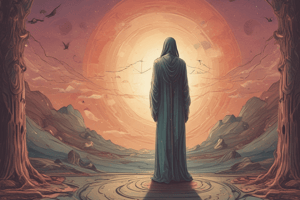Podcast
Questions and Answers
Critically evaluate Fromm's assertion that religion is an expression of basic human needs, considering counter-arguments from sociological perspectives that emphasize religion's role in reinforcing social structures and power dynamics. How might these perspectives be reconciled, if at all?
Critically evaluate Fromm's assertion that religion is an expression of basic human needs, considering counter-arguments from sociological perspectives that emphasize religion's role in reinforcing social structures and power dynamics. How might these perspectives be reconciled, if at all?
Fromm's view may overlook religion's structural role. Reconciliation involves acknowledging both individual needs and societal functions.
Given the potential for misinterpretation and misuse of religious concepts, how can critical hermeneutics be applied to religious texts and traditions to promote responsible interpretation and prevent harmful applications in contemporary society?
Given the potential for misinterpretation and misuse of religious concepts, how can critical hermeneutics be applied to religious texts and traditions to promote responsible interpretation and prevent harmful applications in contemporary society?
Critical hermeneutics can contextualize texts, questioning power dynamics and promoting ethical applications.
In what ways might the phenomenological reduction, as espoused by Husserl, be strategically employed to bracket pre-conceived notions in the investigation of religious experiences, thereby permitting a more direct and unbiased encounter with their intrinsic meaning?
In what ways might the phenomenological reduction, as espoused by Husserl, be strategically employed to bracket pre-conceived notions in the investigation of religious experiences, thereby permitting a more direct and unbiased encounter with their intrinsic meaning?
It minimizes bias, allowing for direct engagement with the experience's inherent significance.
Develop a theoretical framework that integrates insights from both existentialist philosophy and liberation theology to address the problem of meaninglessness in the face of systemic injustice. How can this framework empower individuals to find purpose and agency within oppressive social structures?
Develop a theoretical framework that integrates insights from both existentialist philosophy and liberation theology to address the problem of meaninglessness in the face of systemic injustice. How can this framework empower individuals to find purpose and agency within oppressive social structures?
Assess the proposition that 'religious experience' is fundamentally distinct from 'spiritual experience,' delineating the critical epistemological and ontological differences between theistic encounters and non-theistic, immanent forms of spiritual realization.
Assess the proposition that 'religious experience' is fundamentally distinct from 'spiritual experience,' delineating the critical epistemological and ontological differences between theistic encounters and non-theistic, immanent forms of spiritual realization.
Flashcards
Religion
Religion
A tool used to answer existential questions about life and existence, providing a system of orientation.
Homo Viator
Homo Viator
The constant human pursuit to find something greater than themselves, seeking answers to existential and spiritual burdens.
Religion (Fromm's View)
Religion (Fromm's View)
An expression of basic human needs present in all cultures, deeply affecting lives in both positive and negative ways throughout history.
Religious Experience
Religious Experience
Signup and view all the flashcards
Understanding Religion
Understanding Religion
Signup and view all the flashcards
Study Notes
-
Religion is a tool for answering existential questions about life and existence
-
Religion has been vital to the human condition since the beginning of civilization
-
Religion provides a system of orientation, telling us what to live or die for and is a pursuit of answers to existential and spiritual burdens
-
Religion functions as an anchor at humanity's core, giving meaning to daily existence
-
Humans always seek something greater than themselves
-
Logical thinking leads to the concept of a maker, often identified as God
-
Human civilization has established countless religions over thousands of years
-
German philosopher Erich Fromm argued religion is an expression of basic human needs found in all cultures
-
Religion has affected the present lives of people in good and bad ways
-
There was a point in Western narrative where religion became the end-all and be-all of everything considered true
-
"Religious experience" is the day-to-day experience of God in ordinary life
-
With the religious experience approach, one goes back to raw experience and sees everything as manifestations of something greater
-
One experiences God on a daily basis, even in the most ordinary things
-
Spirituality is treated similarly, focusing on the simple way of life of the ordinary believer
-
Religions, religious experience, and spirituality require careful understanding, as a misstep can lead the believer, family, and society in the wrong direction
-
When religion, religious experience and spirituality are properly understood, it influences on personal and societal levels, transforming the believer and moving society forward.
-
Every religion contains transcendence, and a pursuit of the deepest values of humanity
-
Deepest values of humanity are found through an authentic connection with the Supreme Being – God
Religion
- There is much controversy and little clarity as to the etymology of the word "religion, and this topic has been debated since.
- Cicero proposed the Latin relegere, meaning "to read or go through again in speech or thought" as the root of religion
- The more common etymology of the word religion is the Latin religare, meaning "to bind"
- Cicero and other early etymologists suggest religion is a system binding humans to a social, moral, and legal duty
- Definitions of religion only provide a nominal meaning and does not give a full understanding of the concept
- Numerous scholars, philosophers, sociologists, and theologians have attempted to define religion
- German idealist Immanuel Kant defined “religion is the recognition of all our duties as divine commands"
Fundamental Features of Religion
-
Religion is an avenue to answer big questions about existence
-
Religion provides explanations about faith, the universe, creation, nature, meaning, and form
-
Religion tries to put meaning into the world through myths, theories, and visions
-
Religion provides a scheme for salvation
-
Most religions have a soteriological or salvific dimension, trying to answer "what happens after death?"
-
Religions aim to ensure a good destination when we die, such as heaven and earth for Christians, samsara and moksha for Hindus, and nirvana for Buddhists
-
Religion teaches how to live together and that there is more than the mundane world
-
Religion encourages people to seek beyond finite human experience and aspire for what is greater
-
Religions have symbols and rituals
-
Symbols are signs used for sacred objects or ideas to give meaning to human behavior
-
Religious rituals and practices are prescribed, repeated behaviors with intended outcomes to enrich religion and the person
-
Symbols and rituals help create and transform religious tradition; examples include the cross for Christians, "om" for Hindus, and male circumcision for Jews
-
Every religion provides a moral compass
-
All religions have a sense that there is a right way to live and act which is morality
-
To live a moral life is to live out the precepts of the religion
-
The idea of good and evil provides moral guidance
-
Major religions vary in their definitions of what constitutes a good life
-
The line between moral philosophy and religion is not clear
-
All religions recognize an authority where Religious matters are often settled by religious authorities
-
Most religions are headed by priests or pastors who undergo years of training and education to fulfil their religious role
-
Other religions place emphasis on an internal authority and personal understanding of how to live in the world
-
Religions introduce the existence and nature of a supreme being, which is the defining feature of religion
-
God is the primary object of all religious practice and devotion
-
The understanding of a particular religion mainly involves the knowledge and appreciation of the supreme being or beings
-
All forms of religious devotional systems are considered expressions of the divine
Religious Experience
-
"Religious" may refer to divinity, something holy or sacred, and may refer to a set of beliefs.
-
"Experience" is something that occurs in life such as an event, often something personal or subjective
-
"Religious experience" is a personal experience pertaining to an encounter with the Sacred, understood within a religious framework and is an experience of God.
-
William James made contributions to the field of philosophy of religion and provided a clearer distinction between normal and religious experience
-
Religious experience is transcendental and blocks everything away when one experiences it.
-
Transcendental means taking one away from normal physical experience, making one feel connected to the divine
-
Religious experience blocks everything else away, so you focus your attention and engage only on that particular experience.
-
It is more challenging in modern society with advanced science and technology to encounter something religious
-
Religious experiences are difficult to understand and sometimes impossible to be grasped by limited minds
-
Religious experience is not readily given to everyone because it is not obvious, according to Rudolf Otto
-
It is not the recognition gets from religious experience that is important
-
We should pay attention to are the consequences of religious experience
Spirituality
-
Spirituality is not similar to spiritism, or the belief that spirits exist apart from matter
-
It is also the conviction that when the spirit splits from the body, the spirit haunts the world as ghosts.
-
Spirituality is not the same as Spiritualism which is the belief in the survival of human personality and being able to communicate between the living and the dead, for example, using an Ouija Board
-
Spirituality is not mesmerism or animal magnetism which is an activity that is performed which makes the subject dazed and be subordinated to the operator.
-
Spirituality is not hypnotism.
-
Spirituality is not similar to religiosity
-
Religiosity concerns religion, traditions, and beliefs, and is man-made, external and visible
-
Religiosity is the outward show of religion
-
Spirituality is concerned with the spirit or soul
-
It presupposes that you are an embodied spirit, composed of body and spirit.
-
According to Sawan Ashram,“ Spirituality is the science of developing higher consciousness in Man on the level of the soul, and making one transcend from mere bodily consciousness into cosmic Spirituality and religiosity, so as to enable one to understand the working of the divine plan."
-
Spirituality can exist without religion
-
One does to have to believe in any religion in order to pursue spiritual growth
-
Both religiosity and spirituality would grow more if they were practiced together
-
The terms “religious but not spiritual” and “spiritual but not religious" are becoming a trend today
-
When spirituality and religiosity will be are practiced together, it would produce a better outcome
-
Spirituality can give better meaning to religiosity, while religiosity can guide spirituality
Summary and Conclusion
- Many ways to explain and define religion, religious experience, and spirituality
- An open ministration needed in order to properly understand the different concepts of religion
- The study of religion is harder and more technical than we think it is
- As discussions increase, the concepts and definition of religion may make more sense
Studying That Suits You
Use AI to generate personalized quizzes and flashcards to suit your learning preferences.





